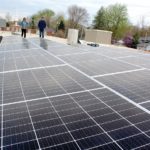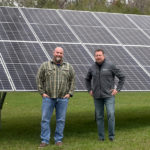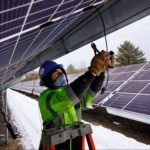(Illustration by The Real Deal with Getty)
Texas officials aren’t handing out medals for those heeding the call for expanding renewable energy sources, but some Houston homeowners are ending up with extra metal.
The delay to secure a CenterPoint for household solar panels has ballooned to five or six months, the Houston Chronicle reported. The Public Utility Commission of Texas hasn’t established a timeline to process permits for the panels, leaving solar companies, trade groups and homeowners frustrated.
The commission created a task force to develop a trial program to study integrating power plants — or smaller units like rooftop solar panels and battery systems — into the Electric Reliability Council of Texas market, however it won’t begin until the first quarter of 2023.
Some policy advocates say the utility company doesn’t have an incentive to connect it.
Katherine Wyszkowski, an interconnection policy advocate with Sunnova solar panel distributors, questioned the utility company’s incentives to hook up the panels. Once the service area is connected and homes are able to produce their own power, the utility company will lose out on money that would otherwise be charged to that home.
“If they can hold someone off for six months, they have six more months being their sole provider,” Wyszkowski asked the outlet.
CenterPoint said in a statement to the Chronicle that one of the reasons for the longer wait times is that there are so many more customers. Houston permit data shows that 2021 had 2,531 applications for solar permits, compared with the 1,142 in 2019.
Texas became the site of a push for expanded renewable power sources as officials braced for the summer heat and hoped to avoid repeating the February 2021 power grid failure. Texas energy consultant Doug Lewin in July credited solar power, alongside conservation, with bailing out the power grid and allowing the state to avoid blackouts.
Houston resident Aaron Regberg tried to heed calls from officials and had panels installed on the roof of his home in January. After more than seven months of denied applications for servces, Regberg told the outlet his effort seemed moot as the panels sit unconnected.
Here I tried to do more than my fair share, but they’re not letting me use the equipment I paid to install on my house,” Regberg told the Chronicle.
— Victoria Pruitt
Contact Victoria Pruitt





















Recent Comments